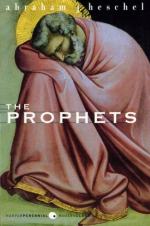
|
| Name: _________________________ | Period: ___________________ |
This test consists of 15 multiple choice questions and 5 short answer questions.
Multiple Choice Questions
1. Who declared ecstasy to be a definitive mark of a prophet?
(a) Aristotle.
(b) Alexander.
(c) Philo.
(d) Plato.
2. Heschel alludes to the fact that to describe God in any terms implies that God is what?
(a) Not all powerful.
(b) Imperfect.
(c) Not all knowing.
(d) Sinful.
3. In contrast to the Stoic sage, Heschel characterizes the prophet as what?
(a) Homo sapiens.
(b) Homo apathetikos.
(c) Homo sympathetikos.
(d) Sui generis.
4. Heschel explains that some think the prophets may have been victims of what?
(a) Hallucinations.
(b) Religious fervor.
(c) Mental abnormalities.
(d) Illusions.
5. To what does Heschel compare the descriptions of prophecy?
(a) Religious literature.
(b) Poetry.
(c) Religious fervor.
(d) Grace and holiness.
6. One theory for prophets and their inspiration is that they had madness in them that led to what?
(a) The belief that they had a job to do.
(b) The belief that God talked to them.
(c) The desire to be great.
(d) A psychic ability.
7. What is anthropopathy?
(a) Personification.
(b) The attribution of human qualities to gods.
(c) The attribution of God-like qualities to humans.
(d) The attribution of human qualities to animals.
8. What does Heschel describe as not a goal, but a challenge, a commitment, a state of tension?
(a) Prophetic sympathy.
(b) Ecstasy.
(c) Prophetic ethos.
(d) Pathos.
9. From what civilization do we get the legacy that great poetry comes into being through madness?
(a) Egyptian.
(b) Greek.
(c) Jewish.
(d) Roman.
10. In what belief is there no grace or repentance for sin, just cause and effect?
(a) Islam.
(b) Christianity.
(c) Tao.
(d) Karma.
11. What appears to us as wild emotionalism in the prophets, Heschel says may seem like what to the prophets themselves?
(a) Proper behavior.
(b) Passion.
(c) Restraint.
(d) Sentimentality.
12. In what religion do you do away with all feeling and obtain a type of peace?
(a) Taoism.
(b) Karma.
(c) Islam.
(d) Hindu.
13. What is the origin of pathos?
(a) Egyptian.
(b) Islamic.
(c) Greek.
(d) Hebrew.
14. What does Heschel define as the belief in the temporary separation of the soul from the body when a person is asleep, sick, or in a trance state?
(a) Pathos.
(b) Prophecy.
(c) Ecstasy.
(d) Sympathy.
15. Heschel admits that pathos is both a paradox and what?
(a) A commandment.
(b) A divine concept.
(c) Easy to explain.
(d) A mystery.
Short Answer Questions
1. Who said that what a poet writes is beautiful, if it is written with enthusiasm and divine inspiration?
2. The nature of man's response to divine reality corresponds to what?
3. One view that Heschel discusses is that an outstanding feature of a poet's consciousness is the sense of being what at the moment of inspiration?
4. Heschel links divine inspiration to what?
5. According to some scholars, the goal should not be pathos but what?
|
This section contains 439 words (approx. 2 pages at 300 words per page) |

|




